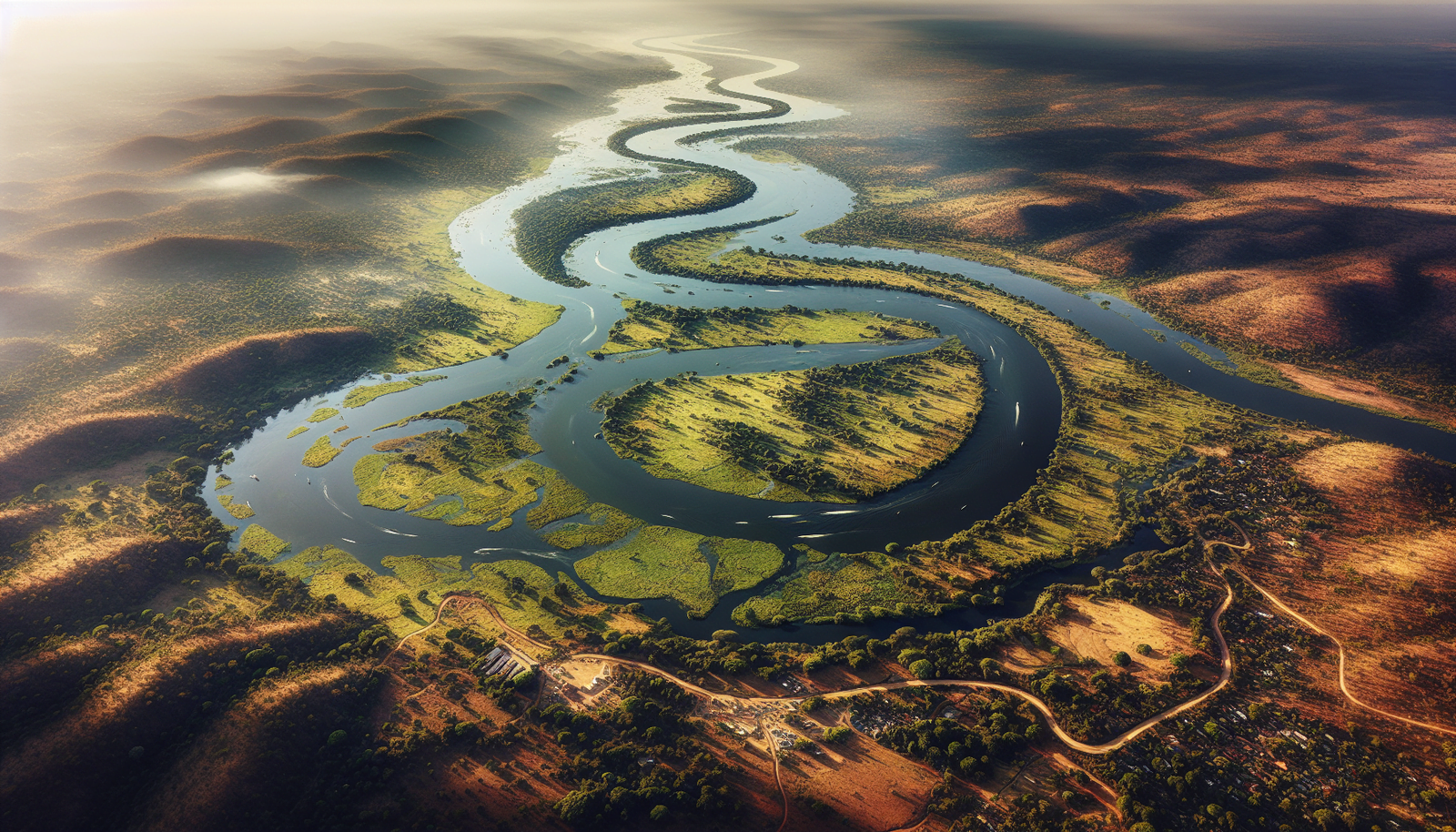Imagine an expansive river, teeming with life, culture, and a sense of history that tends to leave one in awe. This could only describe the Zambezi River, a life force that shapes the lore and destiny of Southern Africa. In the forthcoming article, “Understanding the Importance of the Zambezi River,” you’ll learn about its ecological richness, its massive economic potential, and its central role in aboriginal cultural practices. This river holds the answers to many questions about the vitality and the struggles faced by the region and its inhabitants. Prepare to be enlightened.
Geographical Overview of the Zambezi River
The Zambezi River, your point of interest for this article, has a rich history and role in the geography of Southern Africa. Considering its size and geographical influence, the river is quite significant.
Location and Size of the Zambezi
Stretching a whopping 2,574 kilometers, the Zambezi is the fourth longest river in Africa. It originates from a small spring in northwest Zambia and winds its way through swampland, woodlands, and plains before pouring its water into the Indian Ocean. Its entire course touches eight countries namely; Zambia, Angola, Namibia, Botswana, Zimbabwe, Mozambique, Malawi, and Tanzania.
Key Physical Features Along the Zambezi River
Key geographical features along the river are a landscape lover’s delight. Perhaps the most astonishing is Victoria Falls, one of the Seven Natural Wonders of the World. The river is also home to the Zambezi floodplain, Lake Kariba, one of the world’s largest artificial lakes, and the scenic Batoka Gorge.
Historical Significance of the Zambezi River
The Zambezi River has a profound historical influence on the region it flows through.
Historical Communities Around the Zambezi River
Over the centuries, several communities have settled in the Zambezi basin. They relied on the river for fishing, transportation, and farming, which was made possible by the river’s fertile floodplains. Some notable historical communities include the Tonga people, Barotse, and the Shona people.
Historical Trade and Commerce via the Zambezi
The Zambezi has long acted as a vital trade route, facilitating the movement of goods and people. From the 10th to the 16th century, the river played a vital role in the gold trade between interior Africa and the east coast.

Biodiversity Within the Zambezi River Ecosystem
The Zambezi River is also a hub of biodiversity, with a wide array of unique species and remarkable wildlife patterns.
Unique Species in the Zambezi River
Owing to its diverse habitats, the river is home to many unique species like crocodiles, hippos, and African elephants. The river also boasts over 200 species of fish, including the rare ‘tiger fish.’
Migratory Patterns and Wildlife Corridors Along the Zambezi
The river and its banks serve as essential corridors for the migration of a host of species, especially elephants. Around October, when the dry season peaks, hundreds of elephants can be observed migrating along the Zambezi.
Ecological Importance of the Zambezi River
The river is an ecological powerhouse, contributing immensely to regional ecological balance and facing threats that could destabilize the ecosystem.
Role of Zambezi In Maintaining Regional Ecological Balance
The Zambezi plays a crucial role in maintaining the delicate balance of the region’s ecosystems by providing a habitat for hundreds of species, enriching the soil during the flooding season and creating a varied landscape that supports an array of different plants and animals.
Risks and Threats to the Zambezi Ecosystem
Like many ecosystems worldwide, the Zambezi faces several threats including pollution, deforestation, overfishing and climate change, which are causing a significant decline in the health and vitality of this vital ecosystem.

Economic Value of the Zambezi River
Economically, the Zambezi is a valuable resource, contributing to the regional economy and supporting livelihoods along its course.
Zambezi’s Contribution to Regional Economy
The river plays a crucial role in supporting the economies of the eight countries it flows through. It provides water for agriculture, supports fisheries and gives life to much of the wildlife, which is a significant revenue source through tourism.
Major Economic Activities Along the Zambezi River
Fishing, agriculture, and tourism are prominent economic activities in the Zambezi River basin. Hydroelectric power generation is another key activity, with the river’s waters driving four power stations between two major dams.
Tourism and the Zambezi River
The Zambezi is a major tourist attraction, offering stunning views and unique activities that contribute significantly to the region’s tourism industry.
Tourist Attractions Along Zambezi River
Major tourist attractions along the Zambezi include Victoria Falls, the Zambezi National Park, and Lake Kariba. These attractions offer opportunities for game viewing, bird watching, fishing, river cruising, and white-water rafting.
Contribution of Zambezi River to the Tourism Industry
The extraordinary natural beauty and unique biodiversity of the Zambezi make it a major contributor to the tourism industry of the countries it runs through. The revenue generated from tourism aids in local community development and conservation efforts.
Hydroelectric Power Generation on the Zambezi River
The Zambezi is a significant source of hydropower which is vital for the region’s economic development.
Major Dams and Hydroelectric Projects
The two most significant dams on the Zambezi are the Kariba Dam between Zambia and Zimbabwe, and Cahora Bassa in Mozambique. These dams host hydroelectric projects that supply electricity to several countries in the region, improving their access to energy.
Impacts of Hydroelectric Generation on Surrounding Communities
While there are benefits to hydroelectric power generation, there are also negative implications for communities living along the Zambezi. Large displaced populations due to dam construction, alterations in the river’s flow, and impacts on fisheries are among the challenges faced by these communities.
Climate Change and the Zambezi River
Climate change has already started to leave marks on the Zambezi River, and efforts are ongoing to mitigate these effects.
Effects of Climate Change on the Zambezi River
From more frequent and severe droughts to altered flooding patterns, climate change is profoundly impacting the Zambezi River. These changes threaten the river’s ecology and the communities that depend on it for their livelihood.
Efforts to Mitigate the Impacts of Climate Change
To mitigate these impacts, efforts are underway to introduce more sustainable management of the Zambezi River. Adaptation strategies include improvement of water storage facilities and promotion of sustainable farming practices.
Future of the Zambezi River
The future of this majestic river depends largely on how current challenges are addressed.
Potential Challenges to the Zambezi River
Continued deforestation, pollution, climate change, and unsustainable fishing practices pose a serious threat to the Zambezi River’s future.
Efforts Towards Sustainable Use and Conservation of the Zambezi River
To ensure the Zambezi’s future, conservation bodies and governments are embracing sustainable use and conservation. This involves improved water management, stringent pollution control measures, and sustainable economic development.
Zambezi River in Culture and Heritage
The Zambezi is not just a river in the physical sense. It is deeply rooted in the cultures of the communities living along its course.
Storied and Mythologies Around the Zambezi River
Several stories and mythologies revolve around the Zambezi, from the Tonga people who believe the river is home to a great snake spirit, to the Makololo tribe who revere it as a sacred entity.
Cultural Significance of the Zambezi to Local Communities
The Zambezi plays a crucial part in the cultural practices of various local communities. Fishing festivals, traditional river-based ceremonies, and storytelling around the ancient behaviors of the river, express the deep cultural significance of the Zambezi to these communities. Ultimately, the Zambezi River is a unique blend of rich history, vibrant biodiversity, and cultural significance. It indeed is a lifeblood that needs the world’s attention for its preservation.






